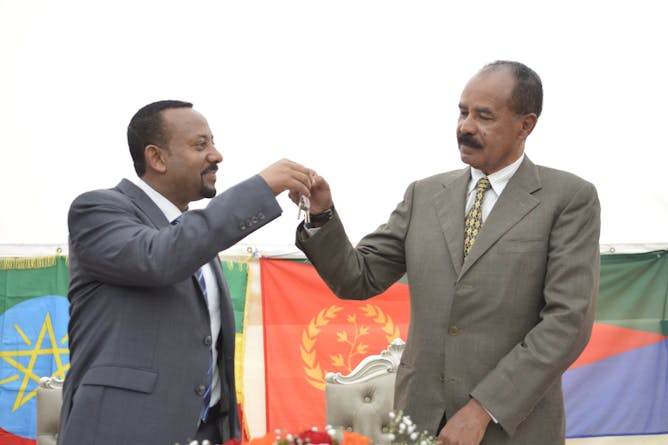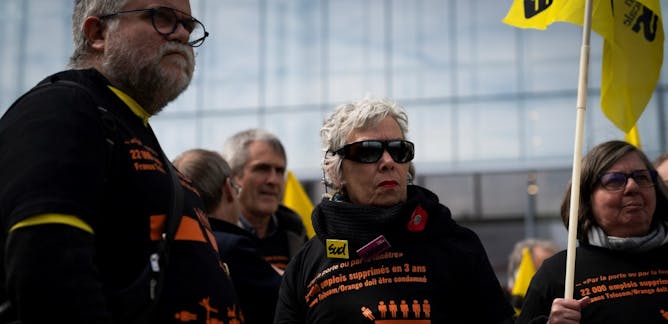|
African leaders have made much progress in stitching up the continent into one free trade zone, a development which will benefit the continent immensely. But greater integration comes with risks. To mitigate these, Danny Bradlow and William N Kring say that African leaders must reinvigorate the establishment of a financial safety net. The African Monetary Fund will fill an important gap, bringing the continent on par with other developing regions.
A year on from the euphoric end to hostilities between Ethiopia and Eritrea, none of the agreements intended to smooth over a history of conflict and war have been implemented. While Ethiopia’s prime minister Abiy Ahmed’s hands are full dealing with internal strife, the Eritrean president Isaias Afwerki is back to his unpredictable ways. Martin Plaut argues that while it’s uncertain what could happen next it’s become clear that the warmth of a year ago has largely gone.
|

Africa has tried for decades to develop robust intra-regional trade. Free trade agreement is the most recent effort
Shutterstock
Danny Bradlow, University of Pretoria; William N Kring, Boston University
Now that African countries have signed up for the continental free trade agreement, they must complete the institutional loop by jumpstarting the creation of the African Monetary Fund.
|

Ethiopia’s Prime Minister Abiy Ahmed (left) and Eritrea’s President Isaias Afwerki at the re-opening of the Eritrean embassy in Addis Ababa.
EPA-EFE/Stringer
Martin Plaut, School of Advanced Study
It's unclear how relations between Addis Ababa and Asmara will develop but the warmth has largely gone.
|
Politics + Society
|

Candice Lingam-Willgoss, The Open University
A young athlete's support network is key to their development and performance, according to sports psychologists.
| |

Herman Wasserman, University of Cape Town; Audrey Gadzekpo, University of Ghana; Chris Paterson, University of Leeds
Western aid has resulted in an Anglo-American culture of journalism education which has proved impractical to implement in African countries with illiberal political regimes.
|
|
|
Business + Economy
|

Venkatesh Shankar, Texas A&M University
On July 5, the online shopping powerhouse turns 25. A marketing professor looks back on how Amazon redefined retail for the world.
| |

Aristea Koukiadaki, University of Manchester; Geoff Pearson, University of Manchester
Survey of 3,000 players in 33 different countries outlines how difficult it is for women footballers.
|
|
|
Health + Medicine
|

Moses John Bockarie, South African Medical Research Council
Sharing data openly across regions and organisations can help to accelerate preparedness and responses to public health emergencies.
| |

Andrew Carey, Baker Heart and Diabetes Institute
Caffeine may be able to increase the function of what we call 'brown fat'. But we shouldn't immediately scramble for the closest long black or flat white and expect to see the kilos drop.
|
|
|
En français
|

Christian-Georges Schwentzel, Université de Lorraine
Les mangas « historiques » sont en vogue depuis quelques années, tandis que l’Égypte ancienne fascine un large public depuis bien plus longtemps encore.
| |

Jean-Christophe Vuattoux, Université de Poitiers
Le verdict sera notamment l’occasion de clarifier certaines définitions juridiques et d’ajuster les politiques de prévention les plus répandues aujourd’hui dans les entreprises.
|
|
|
En español
|

José Escamilla, Instituto Tecnológico y de Estudios Superiores de Monterrey
En el 2030 las empresas valoran más un currículum de evidencias del desempeño profesional que un grado universitario. El Tecnológico de Monterrey ya prepara a los alumnos para ello.
| |

Javier Martín Vide, Universitat de Barcelona
Las predicciones estacionales se obtienen mediante modelos que estiman las anomalías de temperatura y de precipitación para varios meses con un notable grado de incertidumbre.
|
|
|